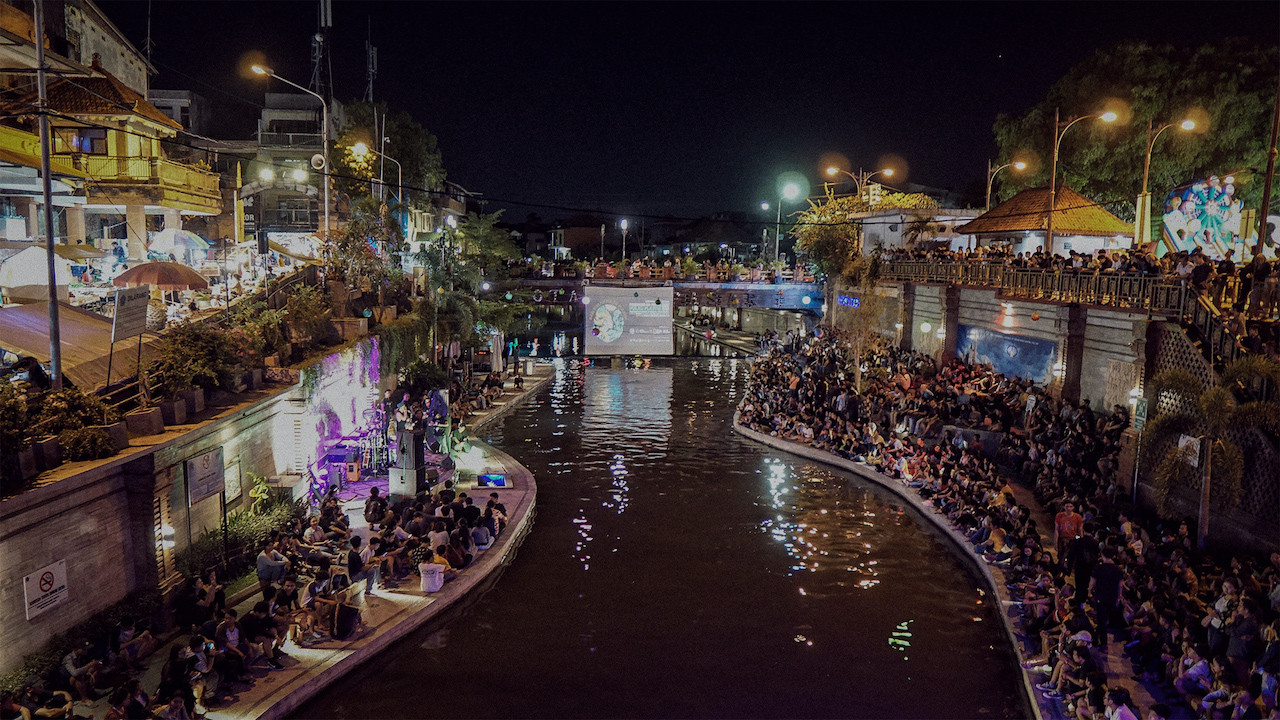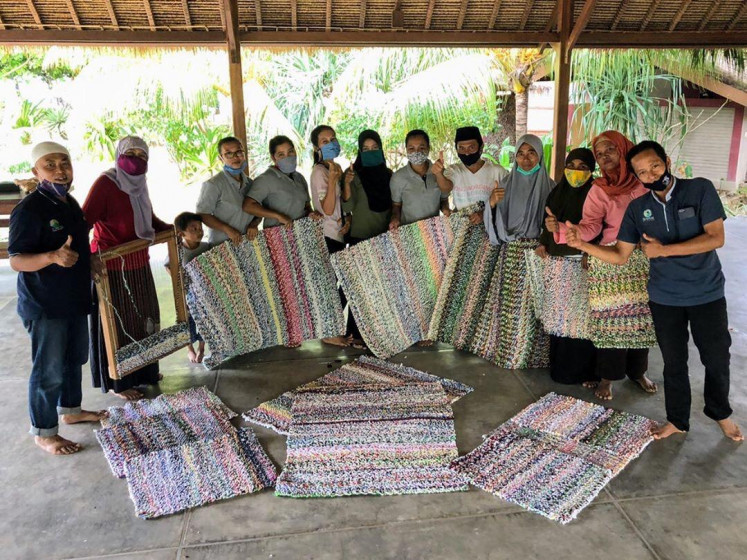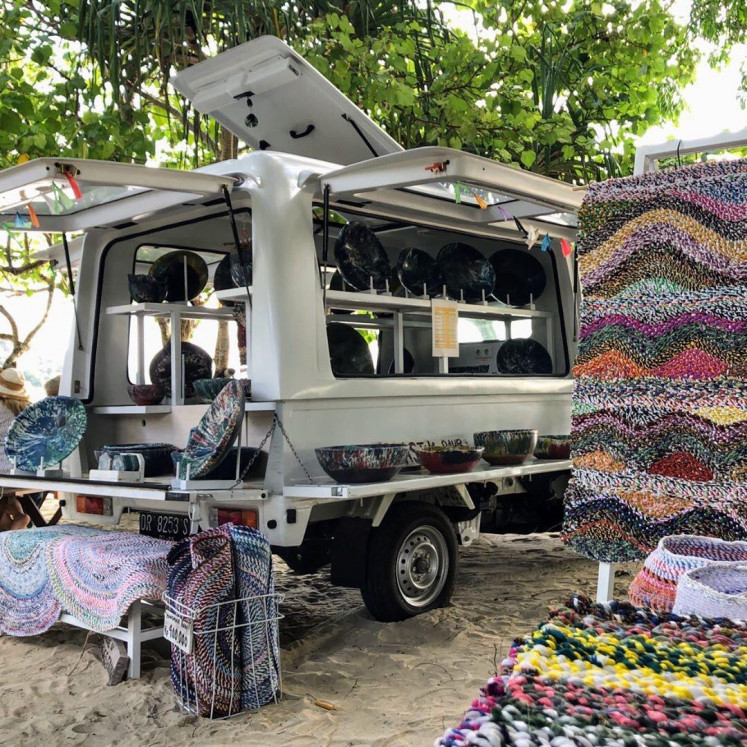Communities use creativity to tackle plastic waste at tourist hubs
The growth of tourism in popular coastal destinations in Indonesia, such as Lombok, West Nusa Tenggara and Bali, has only increased local production of plastic waste, in particular marine plastic debris.
Change Size

I
n 2015, environmental engineering professor Jenna R. Jambeck ranked Indonesia as the world’s second biggest plastic waste producer with 187.2 million tons of plastic waste. It was only topped by China, which had produced 262.9 million tons of plastic waste that year.
The growth of tourism in popular coastal destinations in Indonesia, such as Lombok, West Nusa Tenggara and Bali, has only increased local production of plastic waste, in particular marine plastic debris.
So the residents of these coastal destinations have come up with creative methods to boost public awareness about plastic waste and marine debris.
One such initiative is Plastik Kembali (loosely, “returning plastic”), which recycles plastic waste into handcrafted products with attractive designs.
The initiative opened up shop on Lombok’s Selong Belanak Beach early this year and employs around 15 local craftspeople who make rugs, carpets, baskets, plates and other household products from recycled plastics. Plastik Kembali has given a new lease of life to both the local craftspeople and plastic waste.

“Our work has been greatly inspired by preciousplastic.com [Precious Plastic], based in the Netherlands,” said Plastik Kembali cofounder Elissa Gjertson, who is also a member of the Selong Belanak Community Association.
Gjertson said that the initiative did not have enough electricity to run a plastic-shredding machine of their own, so they sourced the plastics from Surabaya, East Java.
Plastik Kembali displays its products at the Lombok Eco Flea Market, which is open on weekends.
When the government declared COVID-19 a public health emergency in early March, the attendant health policies disrupted the market and the group had to temporarily stop their activities.
The group started resuming its activities at the flea market around August to support the livelihood of its craftspeople. According to Gjertson, the artisans’ welfare had declined in line with the sharp decline in local tourist arrivals.
Plastik Kembali also started operating a mobile store at a nearby restaurant on Sundays, which resulted in 26 direct sales and four online orders in October.

Gjertson added that the group also displayed their items at the gift shop of a local villa and an independent waste bank in Mataram, which resulted in three sales in October.
Amid the efforts to increase its electricity quota so the group can operate its own plastic shredder, it has been collecting plastic bags from minimarkets as well as expanded to collecting used mineral water bottles in the area to supply them to local recyclers.
The Selong Belanak association has also resumed its beach cleanup program with strict adherence to the government’s health and safety protocols, including wearing masks and maintaining physical distance.
Before the COVID-19 crisis, the community association offered a variety of fun and engaging educational programs. These programs primarily targeted local schoolchildren in raising awareness about how to mitigate the plastic waste problem.
“During the [educational] events, we conducted little exercises with them, for instance, asking them to arrange and sort waste into different boxes,” said Gjertson.
“We’d also like to teach the kids to engage their parents in the issue as well, to understand the impact and that by recycling, their parents can actually turn plastic waste into money,” she added.
Another educational initiative is Pulau Plastik (Plastic Island), a collaborative campaign based in Bali that tackles single-use plastics on the resort island and beyond.
Using popular culture and social media campaigns, short films and feature-length documentaries, Pulau Plastik raises awareness about the dangers of single-use plastics to encourage behavior change among the local public.
It also produces a series of public service announcements, calling on people to refuse single-use plastics at stores. The pilot episode has been screened in more than 50 communities at events in Lombok, Java, Sumatra, Sulawesi, Papua and other regions.
Pulau Plastik has held a variety of virtual events and activities during the health emergency, with pupils and students making up the bulk of the participants.
“The parents of these students told me, their children were telling them that they were doing something bad with the plastic waste,” said cofounder and COO Ewa Wojkowska of Kopernik, which partners with Pulau Plastik.
She added that students nowadays were so in touch with global issues that it was much easier to engage them in mainstreaming efforts at plastic waste management.
Another of Pulau Plastik’s partners is I Gede Robi Supriyanto, the vocalist of Balinese grunge band Navicula, who organizes music events to increase public engagement and interest in the plastic waste issue.
“We’ve seen that people have significantly reduced their use of plastic straws and bags, maybe also thanks to the Balinese government’s regulation. But we’ve not seen any reduction in people’s use of food packaging and sachets yet. It’s hard to find alternatives to food packaging,” he said.









